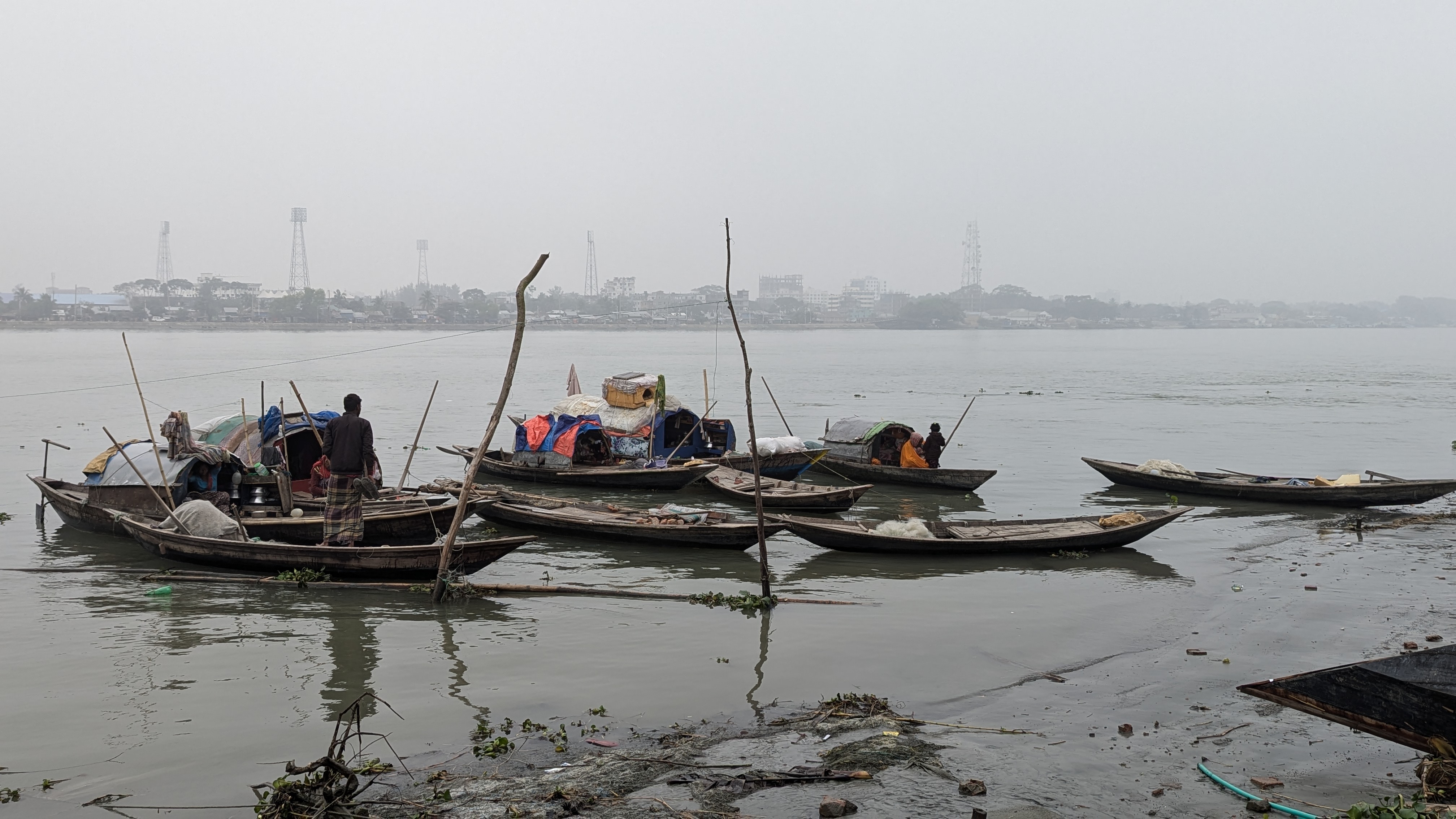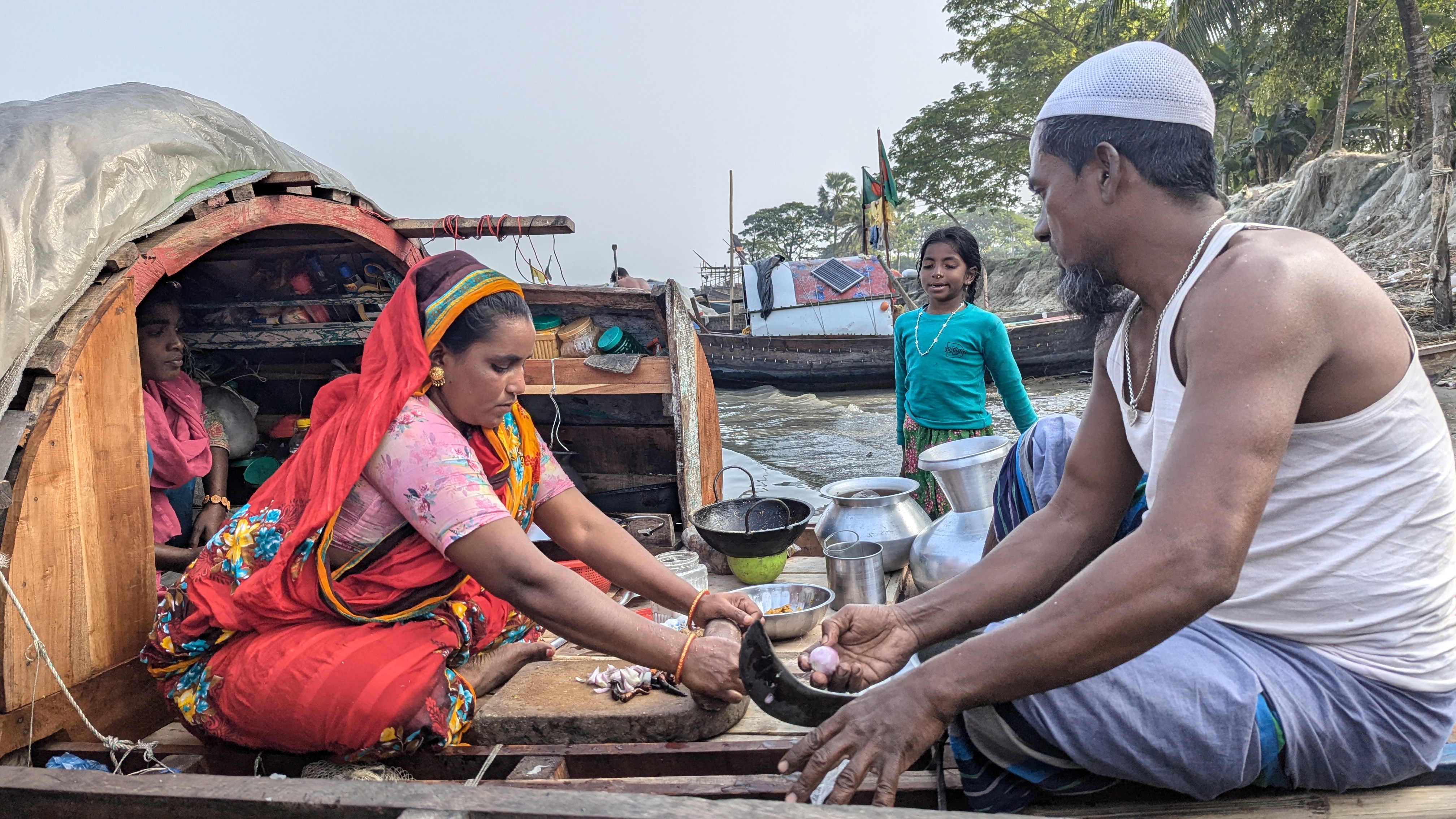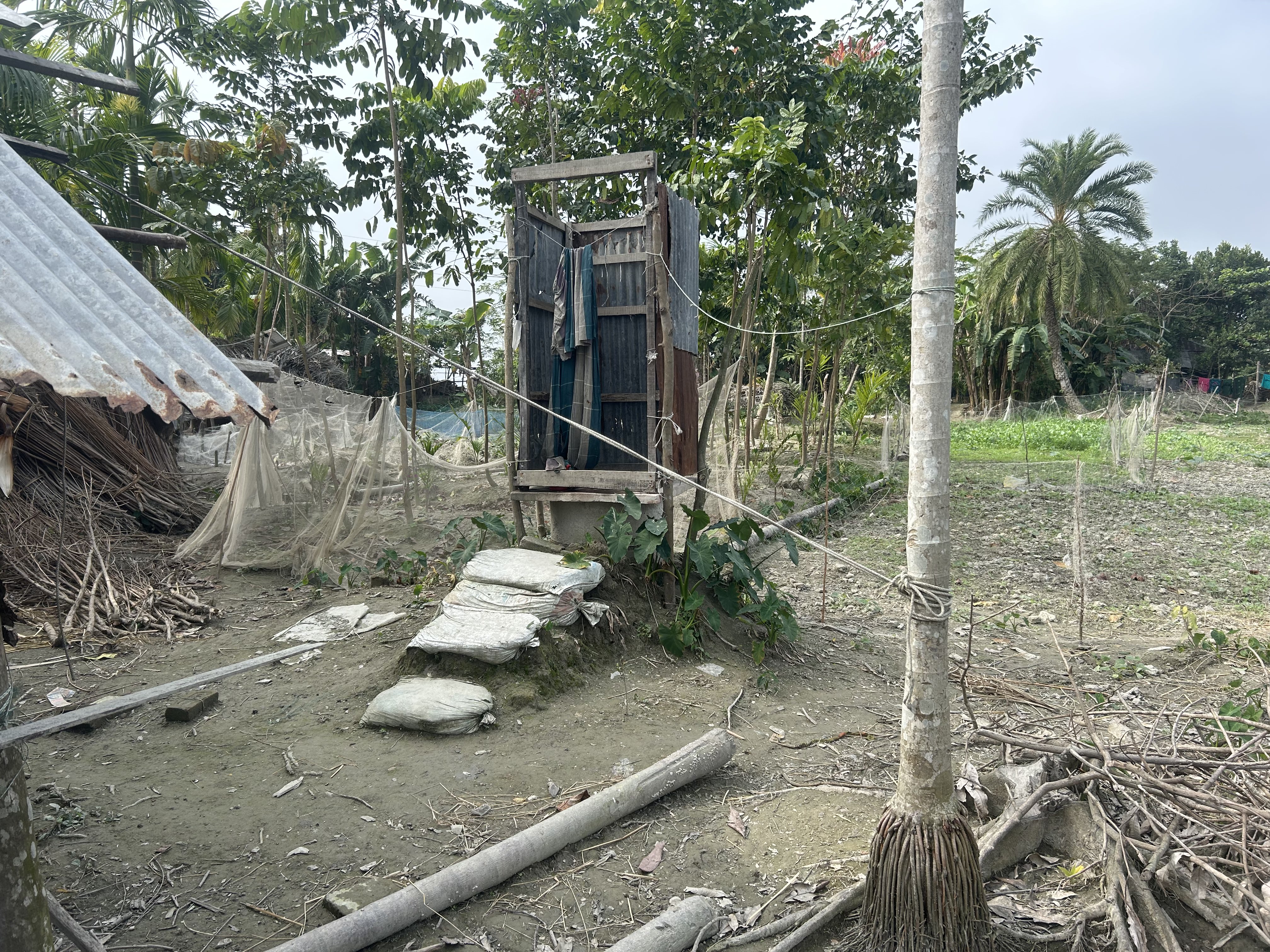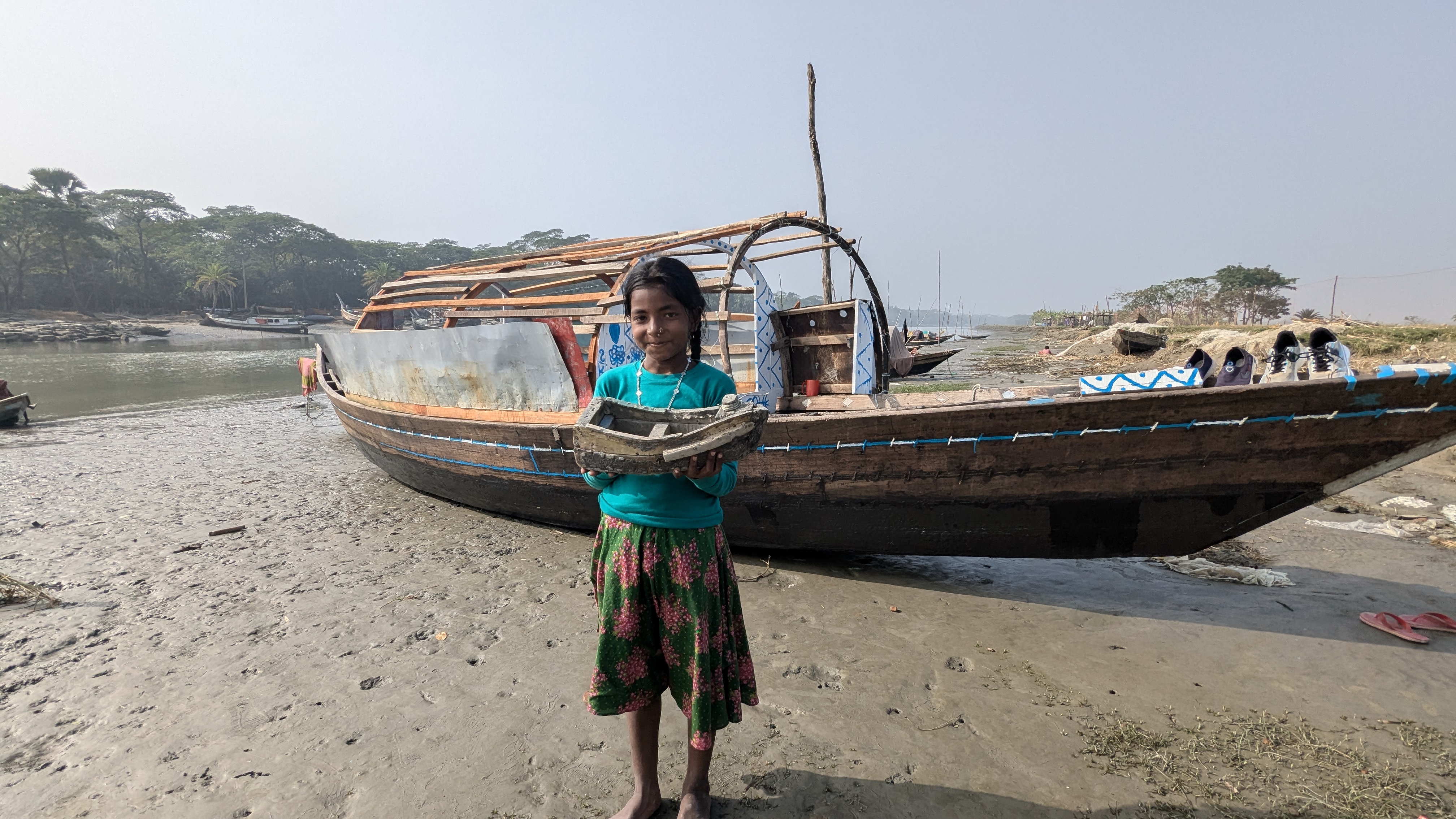On a cold winter morning, a soft blanket of fog lies over the river. The distant sandbars look blurry, almost like smoke. In that hazy light, 50-year-old Jashim Uddin sits on his small wooden boat and looks toward the horizon. Weak sunlight slips through the gaps in the tin roof, but it cannot warm his shivering body. For almost fifty years, this boat has been his world.
He was born here, grew up here, built a family here, and faced both hope and sorrow on this very river. Jashim is a leader of the Manta community, one of the last river-dwelling groups in Bangladesh.
Jashim has become a living witness to the river’s changes. He has seen how the river shifts every year and how their future shifts with it. His community never stays in one place for more than three months. With a quiet sigh, he says, “But life is not the same anymore.”
Historical Origins and Community Today
The Manta people are often called “bede” or “bebaijja” by people who live on land. But the Mantas want a separate identity. They say their way of life is clearly different from the Bedes.
Jashim’s wife, forty-year-old Mumtaz, explains the difference. She says, “Bede people do hijama, catch snakes, and give snake treatment. But we, the Manta people, live only by fishing.”

Researchers still debate how the Manta community began. Their early history on boats is not written clearly. Some experts think they formed as a subgroup of the Bedes. In her book “Bede of Bangladesh,” researcher Ranjana Biswas wrote that the bedes were pushed to the edges of society during the Sena period, and they slowly moved to the rivers to survive.
Over time, they became known as the Manta community. The language of the Bedes, called “thar,” and the language of the Mantas, called “chol,” also show many similarities.
Researcher Mithushilak Murmu estimates that nearly 50,000 Manta people live in Bangladesh today. Most live in different river areas of the Barishal region. Their boats can still be seen in Patuakhali, Bhola, Jhalakathi, Barishal, and Cumilla. Jashim says around 180 families in their group live on the floating waters around Laharhat in Barishal Sadar.

Cramped Life and Seasonal Perils
Life on the boat is cramped and fragile. Jashim’s boat is only 20 feet long and 5 feet wide. Their lives fit into this narrow piece of wood. Cooking pots, fishing nets, and their life live in this small courtyard-sized deck. Five family members share this tiny space.
Winter is harsh for them. “The cold wind cuts through the body,” Jashim says. “We cannot afford warm clothes. So we suffer quietly.” Summer brings a different fear. The tin roof and plastic sheets trap the heat. Inside the boat, breathing becomes hard. Outside, the sun burns. There is nowhere to escape.
The monsoon season is the most dangerous. One big wave can sink a boat. If the anchor slips, the entire family can drift away in the current. “We always fear that the children may fall into the water,” Jashim says. He remembers a child from a nearby family who disappeared during a storm. They found the body the next day, floating on the river.
Summer heat is another struggle. “During Chaitra and Baishakh, the tin roof becomes unbearably hot,” Jashim says. “Outside is the sun. Inside is fire.” During storms and heavy rain, they cannot sleep because they fear the boat may flip at any moment.

Climate Change and Disappearing Fish
Climate change is making their lives worse. The Manta people have no part in causing global warming, yet they pay the highest price. Rising salinity eats away at their boats. “Before, our boat lasted eight or nine months,” Jashim says. “Now we must repair it every two or three months. Each time costs TK 4,000-5,000. A new boat costs TK60,000-70,000. We cannot afford it.”

Fishing is their only means of survival. But the river no longer gives enough fish. “Before, we filled two or three large pots with fish,” Mumtaz said. “Now we get only five or six fish in a day.” Ayesha Khatun, another woman, said, “Fish is getting less. Life is getting hard. We only know how to fish. We know nothing else.” This loss is not just about hunger or money. It threatens the very survival of the community.
Riverbank erosion also disrupts their lives. When the river eats away the shore, the places where they anchor disappear. Tube wells and toilets used by local villagers fall into the river. Jashim says, “When floods come, the banks break. The tube wells break too. We must go far away to find clean water.”

Pollution, Sickness, and a Simple Plea
Pollution makes the river even more unsafe. The river is their home and also their source of drinking water, bathing water, and food. But household waste, sewage pipes, and dirt now flow into it. Mumtaz’s voice holds deep pain. She said, “People living on the banks put their bathroom pipes into the river. The water becomes poisonous. It makes us sick.”
Children and adults suffer from diarrhea, cholera, and skin diseases. Mumtaz pleads, “Please tell them not to put the pipes in the river. They can make a hole in the ground instead. That would help us a lot.” The Mantas themselves also have no toilets. “We live on boats, there is no bathroom,” Mumtaz says. “We have to use the river.” They know this adds to the pollution, but they have no other choice. They are trapped in a cycle they did not create.
The Manta people do not ask for much. Momtaz says, “If we had one toilet and one water tap, so much of our pain would go away.” Jashim adds, “We are citizens of Bangladesh. We have NID cards. Don’t we deserve a little land and a small house?”

They want only a chance to live safely. Clean water, protection from pollution, and the ability to fish without fear are their demands. Their children suffer the most. There are no schools on the river. No madrasa, no college. “How can our children study when we live in the river?” Jashim asks. He worries, “My whole life passed inside a boat. Will my children’s lives also end inside a boat? Will they never get to study?”
Looking at the river, Jashim asks quietly, “Will this country not change even a little for us?” His question is not just his own. It carries the voice of an entire community, fighting to remain alive on the waters of a changing world.
Be part of the solution to climate change, sign-up to CoastalLab Newsletter to get monthly update from us straight to your mailbox.
Get practical guides, handbooks, and resources to strengthen your coastal and climate journalism journey.